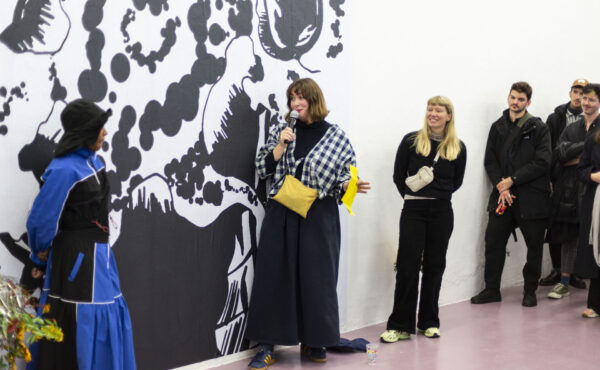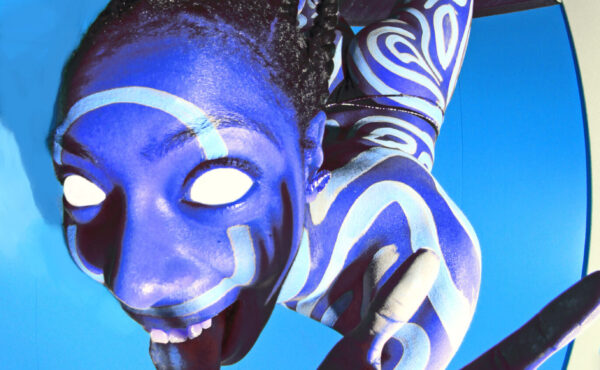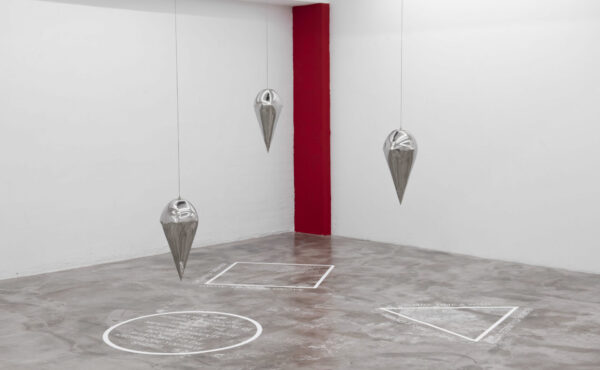
Alexander Cromer, still from ‘Sirens’, Darius looking at the camera
‘The Black Arctic became a way of reclaiming death, and a way of finding some kind of ancestral home’ -talking to Alexander Cromer
Alexander Cromer is a performance artist, storyteller, and ‘critical world-builder’. At PhDArts, a collaboration between the KABK and Leiden University, he is currently pursuing a PhD on practices of radical imagination and resistance. Bringing together science fiction, spoken word and performance, Cromer is committed to the creation of ‘ a place of ancestral connection and healing through what he calls ‘The Black Arctic’.
Could you introduce your research into The Black Arctic?
‘The Black Arctic came about during my masters at Sandberg. I was doing the University of the Underground, which is this art and design research program. When writing my thesis, I read a book by Christina Sharpe called In the Wake: On Blackness and Being (2016). In this book she talks about the ontological and epistemological facets of Blackness in the Afro diaspora, and positions Blackness within the context of the Atlantic Ocean and specifically the Middle Passage: the second of three sea voyages that made up the triangular chattel slave trade used between the 15th and 19th centuries. It stretches over the North Atlantic Ocean and was used to ferry souls from Africa to the New World. Sharpe evokes images of the Atlantic as a spiritual, but also physical, mental and emotional space that persists within the diaspora. I really enjoyed this evocation, so I started doing some research on the Atlantic Ocean and how its water flows. I read into the process of thermohaline circulation, which is the process of oceanic flow from the equator north towards the Arctic, where the water cools down.’
So this is where the Arctic comes in?
[answer Alexander Cromer] ‘Yes. I wanted to depart from, but also complicate, Sharpe’s book. Blackness resides in the wake of the Middle Passage, Sharpe argues, which is in the Atlantic Ocean. We know that the Arctic has a nonlinear relationship with the Atlantic. And as we see from climate change, it has the ability to disrupt its mechanisms. Its glacial ice functions as an archive of earth memory, and its temperatures affect the flow of the Atlantic. I wondered: could the Arctic potentially also disrupt the Middle Passage? That is how The Black Arctic came about.’
‘Christina Sharpe positions Blackness within the context of the Atlantic Ocean and specifically the Middle Passage: the second of three sea voyages that made up the triangular chattel slave trade used between the 15th and 19th centuries’
What is The Black Arctic exactly?
‘It is a fictional alternate universe, where Black people are in Greenland and the Arctic. There was a slave ship called “Zorg” that got lost at sea during the slave trade. The captain decided to get rid of some of the cargo, which were enslaved people, by throwing them overboard. The Black Arctic is based on that story, and how those people drifted upwards to the Arctic to start this fictional society. It’s also remotely related to this idea of Black Atlantis, which is under the same premise but instead of drifting to land, enslaved people started a civilization underwater. Lupe Fiasco’s Drogas Wave is a pretty cool reference for this, as that whole music album is about Black Atlantis. The Black Arctic became a container for a lot of my work that looked into death, and specifically Black death. I became particularly interested in this notion of reclaiming death. Throughout the history of the United States, we couldn’t even have our own deaths, as they were taken from us during police-involved shootings. These deaths were taken from us, proliferated on the internet and became accessible for the whole world. The Black Arctic became a way of reclaiming death, and a way of finding some kind of ancestral home.’
What do you mean when you say that The Black Arctic is a ‘container’ for your work?

Alexander Cromer, still from 'Let me see the colors of your fingertips that which were dyed with time', 2022
‘I’m doing my artistic research PhD at the KABK and Leiden University. I applied there with The Black Arctic as a project, but I have since then decided to kind of shift it into another format. The Black Arctic exists as a container of my work, but my day-to-day artistic practice is spoken word and performance. I have different personas that I embody, depending on what needs to happen. I decided to redirect my research, focussing more on what happens during a spoken word performance. Now I’m really interested in how voice can create spaces for us to practice radical imagination and resistance, or even give us alternate modes of ecological relation. That is what my PhD is focused on now, while still flirting with The Black Arctic.’
‘I’m really interested in how voice can create spaces for us to practice radical imagination and resistance, or even give us alternate modes of ecological relation’

Alexander Cromer, still from 'Let me see the colors of your fingertips that which were dyed with time', 2022

Alexander Cromer, still from 'Let me see the colors of your fingertips that which were dyed with time', 2022
Could you elaborate more on what your daily artistic practice looks like and how you incorporate storytelling and spoken word?
‘Worldbuilding for me has always been of great importance to me. I wrote my first story when I was twelve years old, it was a really shitty science fiction story. Since then, worldbuilding and science fiction have been a way to escape from life. It wasn’t until I started studying that they also became part of my artistic practice. In this worldbuilding process I don’t sit down with the intention to “make a world”; I just begin writing, allowing a voice to take over and explore the world that voice is coming from. In this way this world building process allows us to create spaces for radical experimentation. This is why science fiction is so amazing and that is why it works well. Ursula K. Le Guin and Octavia Butler and all these great writers that are tackling severe social issues are able to do that within science fiction.’
How did you turn from writing to spoken word?

Darius, photo: the artist
‘The writing is very important, but what is more important to me is the use of voice. I feel like there is magic in the voice, and it creates magic as we speak. It summons the spirit of the imagination and makes it tangible in a material way. A lot of my practice exists of wandering about, taking walks, getting upset over something, sitting down to write, while maybe having a little glass of whiskey. While writing I always try to imagine myself speaking those words later. Lately, I have stopped using other instruments. I just want to use my voice in different environments, and see what happens if I start layering or deconstructing it. I am fascinated with the materiality of voice. I have been reading a really good book by Nina Sun Eidsheim called The Race of Sound: Listening, Timbre and Vocality in African American Music (2018). Sun Eidsheim is interested in what she calls the “acousmatic question”: the tendency or desire to recognize the source of a sound one hears. This does not only apply to situations where one hears a sound coming the street and ‘knows’ it to be a car driving by, for example, but also to situations where one hears another person speak and recognizes this sound as trustworthy, or as Black or white. At such moments, we racialize voices; we give meanings to voices that these sounds did not carry within themselves yet.’
‘I have different personas that I embody, depending on what needs to happen’

Alexander Cromer, research material for The Black Arctic: an ice sculpture of Cromer's head. Photo: the artist
How did this book change the way you think about voice?
‘Following Eidsheim, I started to think of voice as a cultural object, in the sense that it depends on the cultural atmosphere that you’re in and the societies you want to cling to. Voice is a collective production in as far as that the entirety of your body is producing that voice in connection to the spaces that you’re in, the air that you are breathing, the people that you’re talking to. The source of voice is not the vocalizer, but the listener. Sound doesn’t give us access to someone’s essential nature. Sound is sound. We can make sonic qualitative observations, calling someone’s voice raspy or low, for example. These describe the sonic qualities. But to say that someone sounds honest, or that someone sounds Black, or white, well, where do such qualifications come from? I think that for this, we have to look at the social and cultural atmospheres that we navigate through and the histories we receive.’
You shared that you tap into different characters and use different voices depending on what is needed in a given situation. Could you share more about these voices?

Alexander Cromer at De School, Amsterdam, on the 29th of April, photo: Imy Hayward @imogenhayward
‘Darius is the main character. His voice sounds deep, wise, and is kind of sexy. Darius is usually my performance persona. He wears a little shawl. Then there’s Dwayne. These are all iterations of stereotypical Black voices that I use, because it is fun to switch modes during a performance, making it possible to play with this idea of voice as essential. You never know who I am because I am always switching my voice. I think this is important because it de-essentializes voice or de-racializes voice. Mostly it is just Darius doing his thing.’
‘I started to think of voice as a cultural object, in the sense that it depends on the cultural atmosphere that you’re in and the societies you want to cling to’

Alexander Cromer at De School, Amsterdam, on the 29th of April, photo: Imy Hayward @imogenhayward
What you are sharing about voice as a cultural object makes me think of the notion of ‘combat breathing’ by Frantz Fanon and the different oppressive factors (such as living under colonial rule) that have an influence on our breathing and voice.
‘Indeed, the voice is a collective production, so speaking already is a mode of ecological relation. The voice cannot exist past the breath that it used to create it. By breathing and voicing the inside of you and releasing that into the environment, it is already a primal mode of ecological relationship. In relation to The Black Arctic a question I explore is: how is this ecology summoned or conjured during a spoken word event? The how? is what interests me.’
Click here to see Alexander Cromer’s videowork ‘Let me see the colors of your fingertips that which were dyed with time’, 2022
Leana Boven
is a curator, cultural programmer and researcher with a background in gender and (post)colonial studies. She curated the exhibition On Collective Care & Togetherness at MAMA in Rotterdam, and currently works as a curator at Casco Art Institute: Working for the Commons


















